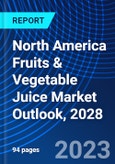This report comes with 10% free customization, enabling you to add data that meets your specific business needs.
1h Free Analyst TimeSpeak directly to the analyst to clarify any post sales queries you may have.
According to the research report North America Fruit and Vegetable Juice Market Outlook, 2028, the North America fruit and vegetable juice market was valued at USD 45.49 Billion in 2022. Fruit and vegetable juices are among the fastest-growing segments in the beverage industry in North America as health problems increase among consumers. Health and fitness have become important in today's world, and there have been latent changes in the way people drink healthy juices from soda pop. There is an increasing awareness and focus on health and wellness among consumers in North America. Fruit and vegetable juices are perceived as a convenient and accessible way to incorporate essential nutrients and vitamins into daily diets. Many individuals seek out juices as a means to support their overall well-being and maintain a healthy lifestyle. The demand for natural and organic juice has been on the rise in North America. Consumers are becoming more conscious of the ingredients used in their food and are seeking products that are free from artificial additives, preservatives, and pesticides. Fruit and vegetable juices made from organic produce are gaining popularity as they are seen as healthier and more environmentally friendly options. Based on the types included in this report, fruit juice, vegetable juice, and fruit and vegetable blends have the highest market share in the North American region. The factor of a healthy juice trend is driving the market in the North American region. In consideration of consumer preference, orange and mango juices are some of the most popular juices in the region, followed by apple, cranberry, grape, etc. There is a growing preference for natural and fresh orange juice in North America. Consumers seek out orange juice made from freshly squeezed oranges without added sugars, preservatives, or artificial ingredients. Cold-pressed orange juice, which is extracted using a hydraulic press without heat, is gaining popularity for its perceived freshness and higher nutritional content.
There are several opportunities and constraints for the fruit and vegetable juice market in North America. The fruit and vegetable juice market faces competition from other beverage categories, such as bottled water, flavoured water, energy drinks, and functional beverages. Consumers have a wide range of options to choose from, and the juice market needs to differentiate itself to stay competitive. Market expansion is hampered by shifting raw material prices. The prices of raw materials like sugar, fruits, and vegetables, as well as materials for packaging like plastic, aluminum, and paper, are extremely volatile. As a result, fruit and vegetable mixed juice manufacturers incur high costs while procuring raw materials. This also affects the purchase decisions of consumers, which affects the market performance of manufacturers. Manufacturers need to address these concerns through product formulations and messaging. The availability of fresh fruits and vegetables for juice production can be seasonal, leading to challenges in sourcing consistent and high-quality ingredients throughout the year. Manufacturers may need to explore alternative sourcing options or invest in storage and preservation techniques to overcome these constraints. As well as the many opportunities for the fruit and vegetable juice market, the growing focus on health and wellness presents a significant opportunity for the fruit and vegetable juice market. Consumers are increasingly seeking nutritious and natural beverages, and juices made from fruits and vegetables align with these preferences. There is a rising demand for organic and natural foods and beverages, including fruit and vegetable juices. Consumers are becoming more conscious of the ingredients and production methods used in their food, driving the demand for organic and natural juices.
Based on the distribution channel, it includes supermarkets and hypermarkets, convenience stores, online, and others (cafés, clubs, restaurants, etc.). In the North American region, supermarkets and hypermarkets account for the largest market shares. Hypermarkets and supermarkets offer a wide range of fruit and vegetable juices, including fresh produce, packaged juices, and beverages. They provide a one-stop shopping experience for consumers, allowing them to find a variety of options in one location. There are various hypermarkets and supermarkets that offer fruit and vegetable juice in North America, including Walmart, Kroger, Costco, and Whole Foods Market. The industry consists of a mix of large multinational companies, regional players, and smaller juice producers. Some of the major players in the North American fruit and vegetable juice market include The Coca-Cola Company, PepsiCo, Dr Pepper Snapple Group, Ocean Spray Cranberries, and Campbell Soup Company, among others. These companies often have a wide portfolio of juice brands and products, catering to different consumer preferences.
Considered in this report
- Geography: North America
- Historic year: 2017
- Base year: 2022
- Estimated year: 2023
- Forecast year: 2028
Aspects covered in this report
- North America Fruit & Vegetable Juice market with its value and forecast along with its segments
- Country-wise Fruit & Vegetable Juice market analysis
- Various drivers and challenges
- On-going trends and developments
- Top profiled companies
- Strategic recommendation
Countries covered in the report:
- United States
- Canada
- Mexico
By Type
- Fruit Juice
- Vegetable Juice
- Fruit & Vegetable blend
- Nectar
By Distribution Channel
- Supermarket/hypermarket
- Convenience Stores
- Online
- Others (Cafes, Clubs, Restaurant’s, Etc.)








